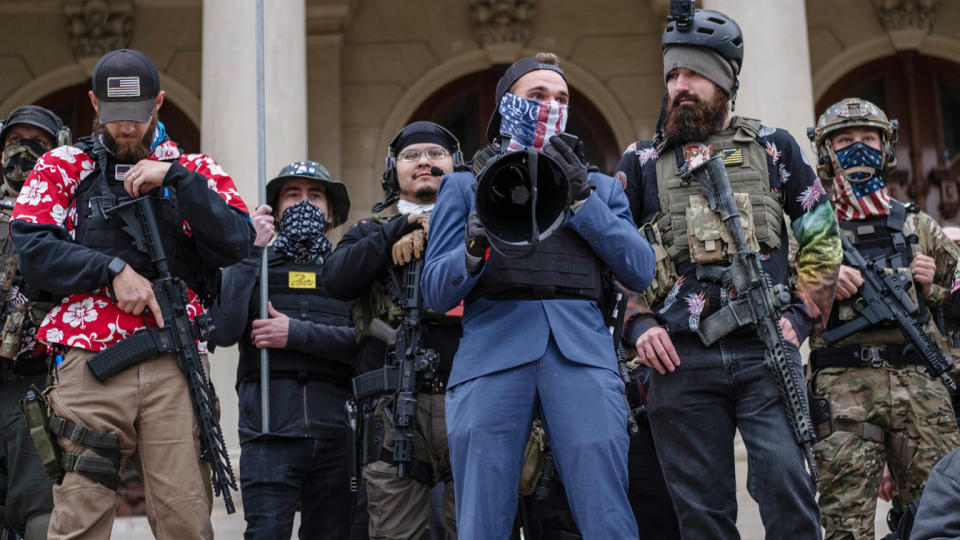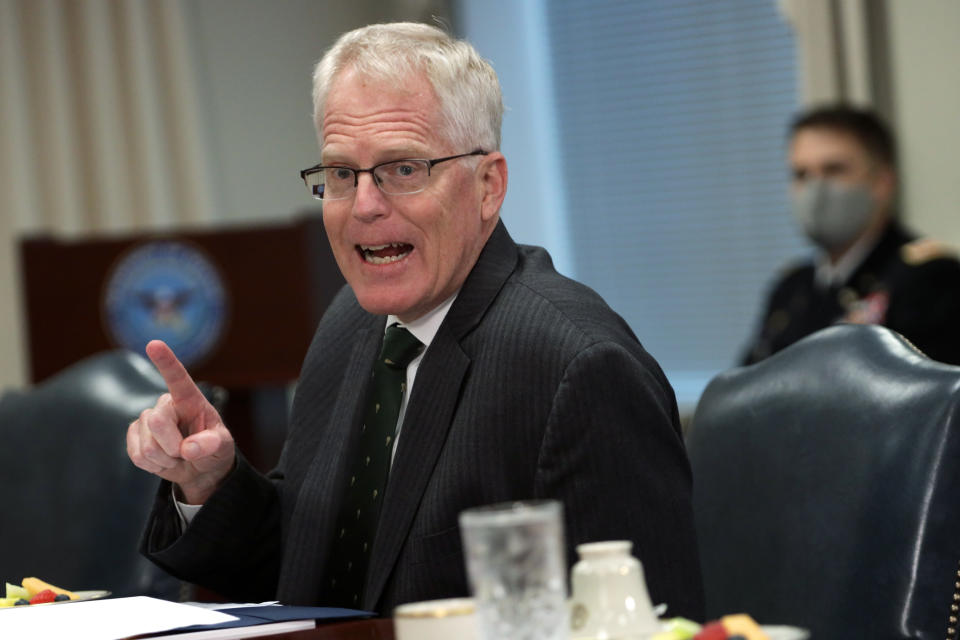Exclusive: Counterterrorism agency increasingly eyes right-wing threats as Trump era winds down
Even as President Trump and his allies have tried to downplay the threat of right-wing extremism and blame violence on the political left, one intelligence agency has been quietly ramping up its warnings about the threat of domestic threats, such as white supremacists, according to interviews and internal government documents.
The National Counterterrorism Center, an agency formed in the wake of the 9/11 attacks to combat international terrorism, has been increasingly focused on domestic extremists, including those who have no known connection to a foreign group. One example of that new focus is its weekly internal digest for the week of the presidential election, when four of the top ten extremist threats highlighted by the agency were purely domestic, including the “boogaloo” movement, white supremacists, and militia members.
The digest also includes three pages dedicated to the history of Timothy McVeigh, who was responsible for the 1995 bombing of a federal office building in Oklahoma City, Okla., to highlight risk factors for terrorist mobilization.
“Reviews of McVeigh’s struggles as a youth, his background and relationships, his experiences in the U.S. Army, and during the period between his discharge and the bombing indicate that he probably had several risk factors for mobilization to violent extremism,” says the digest, which covers the week of Oct. 29 – Nov. 4.
One of those factors, the digests notes, are “white supremacist views.”
NCTC Nov. 4 digest by Sharon Weinberger on Scribd
The agency’s shift to domestic right-wing threats is all the more surprising given that its previous director was Christopher Miller, who was tapped by President Trump last week to take over at the Pentagon to replace fired Defense Secretary Mark Esper. Miller had been appointed by Trump as the head of the counterterrorism center in April.
A Pentagon spokesperson declined to comment on Miller’s prior work at the center.
The focus on McVeigh and white supremacists wouldn’t be surprising to many organizations that study extremism, except the remit of the center has long been foreign terrorism, a disclaimer included on the weekly digest. “NCTC serves as the primary organization in the U.S. Government for integrating and analyzing all intelligence pertaining to terrorism possessed or acquired by the U.S. Government (except purely domestic terrorism),” reads a statement at the end of the digest.
One former Obama counterterrorism official pointed out the obvious contradiction between the disclaimer and the report itself. “How can you say McVeigh isn’t domestic?” said the former official. “You just can’t, you can’t.”
This official, who had work closely with the counterterrorism center, said officials there used to give slideshows on McVeigh many years ago and saw it as a positive development that they’d returned to a focus on domestic radicalization. But the official also said the center appears to be having an identity crisis and seems confused about what exactly its role should be.
The counterterrorism center was created after 9/11 to help share information on international terrorist threats among U.S. government agencies and U.S. allies, and in years past it has only looked at domestic terrorism if it had a link to a foreign organization, such as the Islamic State or al-Qaida. Yet with the rise of right-wing extremist attacks, a number of national security experts have advocated for expanding its area of responsibility solely to domestic terrorism.

In fact, efforts to expand counterterrorism center’s mission to domestic terrorism took off under Miller’s predecessor Russ Travers, with the backing of officials in the Justice Department and elsewhere. They argued that right-wing extremism is global, and the center could be doing more to disable the threat.
In an earlier interview with Yahoo News, Travers said this expansion began in 2018 when colleagues in the field expressed a great need for information on domestic terrorism from local and state law enforcement. “They were asking our reps more and more questions on the domestic terrorism side rather than the Islamist side,” he said.
Travers said he “asked the lawyers” if his analysts could even look at domestic terrorism based on the legal authorities that were used to establish the center, which focused on international terrorism. “The lawyers came back and said, ‘You know, you’ve really got quite a lot of room to run, the key point would be that unlike in the international side you would not be the primary organization, the bureau clearly has the lead and the question would be, how could we support FBI?” he said.
In September 2019, the center held a joint conference with the FBI and the Department of Homeland Security to look at the U.S. government’s overall approach to dealing with domestic terrorism and help formulate a new policy, according to the January 2020 conference report, which was obtained by Yahoo News. The report, which outlines barriers and solutions to combating domestic terrorism, suggests exploring the creation of a criminal statute for domestic terrorism.
In July 2020, however, acting Director of National Intelligence Richard Grenell abruptly fired Travers from his job as acting head of the counterterrorism center. His termination came after he detailed concerns to the intelligence community’s inspector general. He has not publicly discussed those concerns, which were reportedly classified.
“I didn’t fire Russ Travers, I offered him another job in the intel community,” Grenell told Yahoo News.

Travers, in an email to Yahoo News, disputed that claim. “I walked into my first meeting with Acting DNI Grenell on 18 March, I thought to brief him about the center,” Travers wrote. “Instead, he immediately took the meeting over and said I was being removed and my deputy was being sent back to NSA.”
Since Travers was a civil servant, Grenell couldn’t fire him from government employment, but he could and did remove him from his current job. “He can play whatever word games he'd like, but any reasonable person would interpret that as being fired,” Travers wrote.
Yet Travers’s move to domestic terrorism, which appears to still influence the center’s work, has been applauded by some of his former colleagues. “Russ’s argument was, there’s no such thing as ‘purely domestic,’” recalled Mary McCord, his counterpart at the Justice Department.
After Travers’s ouster, several of his former colleagues, including McCord and his predecessor at the agency, Nick Rasmussen, made a public push for the NCTC to do more on the domestic side. In a Lawfare article published last year, McCord, Rasmussen and Joshua Geltzer, who served as a counterterrorism official in the Obama and Trump administrations, argued for the center’s expansion into domestic threats.
The Lawfare article came on the heels of the Christchurch, New Zealand, attack, whose perpetrator left a manifesto citing inspiration from attacks around the globe.

It appears, based on election week digest with its discussion of McVeigh and highlighting recent cases of domestic terrorism, the counterterrorism center is in fact continuing Travers’s push into domestic terrorism.
“It’s good to see that NCTC is finding they have a role here,” said McCord, who reviewed the unclassified weekly digest for Yahoo News.
A spokesperson for the center declined to comment specifically on the weekly digest, but offered a general statement on the center’s work.
“NCTC’s role concerning domestic terrorism is one of support to the FBI and DHS, and includes ensuring that primary federal agencies and state, local and tribal partners have access to and receive all-source intelligence support needed to execute their CT plans or perform independent, alternative analysis,” NCTC spokesperson Susan Miller told Yahoo News.
At the heart of the center’s expansion into domestic terrorism is the belief that there are parallels between the radicalization of those who join the Islamic State and those who become involved in right-wing extremist groups, like militias.
Travers’s predecessor, Nick Rasmussen, said that it appears the center is looking at McVeigh’s path to radicalization as the agency has historically done for Islamist radicalization.
Rasmussen, who also reviewed the document, said the McVeigh section details “what indicators you might be able to reconstruct in hindsight, the kind of intellectual journey he took,” he told Yahoo News.
“The indicators and pathways someone goes through in the radicalization process can look similar even though they come from different ideologies,” he said. “In many cases that pathway might be similar to identify.”
McCord also noted parallels between the NCTC’s work identifying risk factors and indicators of mobilization with McVeigh and, for example, American fighters heading to Syria, both in the way the report was written and in the specific warning signs themselves.
“I’ve seen this movie before,” she said.
Sean Naylor contributed reporting.
___
Read more from Yahoo News:
Obama says Republicans 'clearly know better,' but are 'humoring' Trump about voter fraud
Trump’s national security advisor: It ‘obviously’ looks as if Biden won
Trump is refusing to concede. Here’s how losing candidates in history have done it.
Rage, tweets and TV: A vision of a Trump post-presidency begins to emerge


